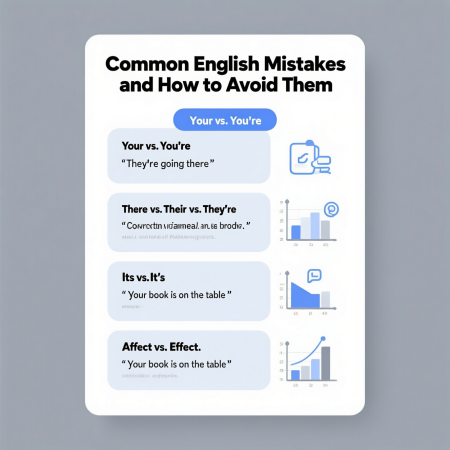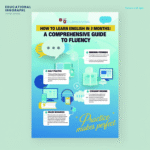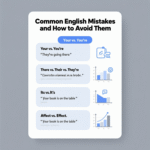Mastering the English language is a journey that requires attention to detail, practice, and a deep understanding of its nuances. Whether you’re a native speaker or learning English as a second language, common English mistakes can undermine your communication, both in writing and speaking. These errors, ranging from grammatical slip-ups to misused words, can confuse your audience and diminish your credibility. In this comprehensive guide, we explore the most common English mistakes, their causes, and practical strategies to avoid them, ensuring your communication is clear, professional, and impactful.
- Why Correct English Matters
- Grammatical Errors and How to Fix Them
- Punctuation Errors to Watch For
- Vocabulary and Word Choice Errors
- Common Pronunciation Mistakes
- Sentence Structure and Clarity
- Spelling Errors to Avoid
- Common Idiomatic and Phrasal Verb Errors
- Cultural and Contextual Errors
- Tips for Mastering English and Avoiding Mistakes
- Advanced Strategies for Polished English
- Read Aloud for Clarity
- Expand Your Vocabulary
- Master Contextual Nuances
- Practice Paraphrasing
- Stay Updated on Language Trends
- Common English Mistakes in Specific Contexts
- Recommendations and Suggestions
- Frequently Asked Questions (FAQs)
Why Correct English Matters
Effective communication hinges on clarity and precision. Mistakes in grammar, punctuation, or word choice can obscure meaning, leading to misunderstandings or a lack of trust from your audience. Whether you’re crafting a business email, writing an academic paper, or engaging in casual conversation, avoiding common English mistakes elevates your message. By addressing these errors, we empower ourselves to communicate with confidence and authority, fostering stronger connections in professional, academic, and personal settings.
Grammatical Errors and How to Fix Them
Subject-Verb Agreement Mistakes
One of the most frequent common English mistakes involves subject-verb agreement. This occurs when the subject and verb in a sentence do not align in number (singular or plural). For example, saying “The team are winning” instead of “The team is winning” is incorrect because “team” is a singular collective noun.
-
Why it happens: Confusion arises with collective nouns (e.g., team, group) or when the subject is separated from the verb by a long phrase.
-
How to avoid it:
-
Identify the subject clearly before choosing the verb.
-
For collective nouns, treat them as singular unless referring to individual members (e.g., “The team members are celebrating”).
-
Practice with complex sentences to ensure agreement.
-
Example: Incorrect: “The list of items are on the table.” Correct: “The list of items is on the table.”
Misusing Apostrophes
Apostrophes are often misused in possessives and contractions, leading to confusion. A classic error is mixing up “its” and “it’s” or adding apostrophes to plural nouns (e.g., “apple’s” instead of “apples”).
-
Why it happens: Writers confuse possessive pronouns with contractions or overgeneralize apostrophe rules.
-
How to avoid it:
-
Use “it’s” only for “it is” or “it has.” Use “its” for possession (e.g., “The dog wagged its tail”).
-
Avoid apostrophes for plural nouns unless they are possessive (e.g., “The cats’ toys” vs. “The cats”).
-
Proofread carefully to catch misplaced apostrophes.
-
Example: Incorrect: “The book’s are on the shelf.” Correct: “The books are on the shelf.”
Run-On Sentences and Comma Splices
Run-on sentences and comma splices occur when independent clauses are incorrectly joined. For instance, “I went to the store, I bought milk” is a comma splice because two independent clauses are joined by a comma without a coordinating conjunction.
-
Why it happens: Writers may rush to connect ideas without proper punctuation or conjunctions.
-
How to avoid it:
-
Use a period, semicolon, or coordinating conjunction (e.g., and, but, or) to separate clauses.
-
Break long sentences into shorter, clearer ones.
-
Read sentences aloud to identify unnatural pauses.
-
Example: Incorrect: “She loves hiking, she goes every weekend.” Correct: “She loves hiking, and she goes every weekend.”
Punctuation Errors to Watch For
Overusing or Underusing Commas
Commas are essential for clarity but are often overused or omitted. For example, omitting a comma in a compound sentence or adding one unnecessarily in a simple sentence can confuse readers.
-
Why it happens: Uncertainty about comma rules leads to inconsistent usage.
-
How to avoid it:
-
Use commas to separate independent clauses with a coordinating conjunction.
-
Include commas after introductory phrases (e.g., “After dinner, we went for a walk”).
-
Avoid commas between a subject and verb unless needed for clarity.
-
Example: Incorrect: “Before leaving the house, was chaotic.” Correct: “Before leaving, the house was chaotic.”
Misplacing Quotation Marks
Quotation marks are often misused in dialogue or when citing sources, particularly in American English where punctuation placement differs from British English.
-
Why it happens: Writers may follow inconsistent style guides or misunderstand rules.
-
How to avoid it:
-
In American English, place periods and commas inside quotation marks (e.g., She said, “I’m tired.”).
-
Use single quotation marks for quotes within quotes (e.g., “He said, ‘I’m coming,'” she recalled).
-
Consult style guides (e.g., APA, MLA) for consistency.
-
Example: Incorrect: “I love to read”, she said. Correct: “I love to read,” she said.
Overusing Exclamation Points
Exclamation points are often overused for emphasis, diluting their impact and making writing appear unprofessional.
-
Why it happens: Writers use exclamation points to convey excitement but overuse them in formal contexts.
-
How to avoid it:
-
Reserve exclamation points for genuine excitement or emphasis.
-
Use strong verbs and adjectives to convey tone instead of relying on punctuation.
-
Limit exclamation points to one per paragraph in casual writing and avoid them in formal writing.
-
Example: Incorrect: “This is amazing! I can’t believe it! Wow!” Correct: “This is remarkable. I’m truly impressed.”
Vocabulary and Word Choice Errors
Confusing Homophones
Homophones—words that sound the same but have different meanings and spellings—are a common source of errors. Examples include “there,” “their,” and “they’re,” or “affect” and “effect.”
-
Why it happens: Similar pronunciation leads to confusion, especially in fast-paced writing.
-
How to avoid it:
-
Memorize common homophones and their meanings.
-
Use mnemonic devices (e.g., “affect” is a verb, “effect” is a noun in most cases).
-
Proofread slowly to catch homophone errors.
-
Example: Incorrect: “Their going to the park.” Correct: “They’re going to the park.”
Misusing Similar Words
Words with similar meanings but different connotations, such as “imply” vs. “infer” or “less” vs. “fewer,” are often misused.
-
Why it happens: Subtle differences in meaning are overlooked.
-
How to avoid it:
-
Study word pairs with nuanced differences (e.g., “imply” means to suggest, “infer” means to deduce).
-
Use “fewer” for countable nouns and “less” for uncountable nouns (e.g., “fewer books,” “less water”).
-
Consult a thesaurus or dictionary for clarity.
-
Example: Incorrect: “She inferred that I was upset.” Correct: “She implied that I was upset.”
Overusing Vague Words
Vague words like “thing,” “stuff,” or “very” weaken writing by lacking specificity.
-
Why it happens: Writers default to familiar, broad terms under time pressure.
-
How to avoid it:
-
Replace vague words with precise alternatives (e.g., “item” instead of “thing”).
-
Avoid overusing intensifiers like “very” by choosing stronger adjectives (e.g., “exhausted” instead of “very tired”).
-
Revise drafts to enhance specificity.
-
Example: Incorrect: “He has a lot of stuff.” Correct: “He owns numerous gadgets.”
Common Pronunciation Mistakes
Mispronouncing Commonly Used Words
Pronunciation errors, such as saying “nucular” instead of “nuclear” or “expresso” instead of “espresso,” can undermine spoken communication.
-
Why it happens: Regional dialects or unfamiliarity with standard pronunciation cause errors.
-
How to avoid it:
-
Listen to native speakers or use pronunciation tools like Merriam-Webster’s audio guides.
-
Practice commonly mispronounced words (e.g., “library,” not “libary”).
-
Record yourself speaking to identify errors.
-
Example: Incorrect: “I ordered an expresso.” Correct: “I ordered an espresso.”
Stressing the Wrong Syllable
English words often have specific syllable stress patterns, and misplacing stress can confuse listeners (e.g., “PHO-to-graph” instead of “pho-TOG-raph”).
-
Why it happens: Non-native speakers may apply stress patterns from their native language.
-
How to avoid it:
-
Use dictionaries that indicate syllable stress (e.g., Merriam-Webster or Cambridge).
-
Practice with native speakers or language apps.
-
Break words into syllables to understand stress patterns.
-
Example: Incorrect: “I’m studying ECO-nomy.” Correct: “I’m studying e-CON-omy.”
Sentence Structure and Clarity
Overly Complex Sentences
Long, convoluted sentences can confuse readers and obscure meaning.
-
Why it happens: Writers attempt to sound sophisticated or combine too many ideas.
-
How to avoid it:
-
Aim for clarity by using shorter sentences.
-
Break complex ideas into multiple sentences.
-
Use active voice for directness (e.g., “She wrote the report” vs. “The report was written by her”).
-
Example: Incorrect: “The manager, who was recently hired, having extensive experience, decided to implement new strategies, which were innovative.” Correct: “The recently hired manager, with extensive experience, implemented innovative strategies.”
Dangling Modifiers
Dangling modifiers occur when a descriptive phrase doesn’t clearly refer to the intended subject, leading to confusion (e.g., “Running to the store, the rain started”).
-
Why it happens: Writers place modifiers too far from the subject they describe.
-
How to avoid it:
-
Ensure the modifier is next to the noun it describes.
-
Rewrite sentences to clarify the subject.
-
Read sentences aloud to catch illogical structures.
-
Example: Incorrect: “Walking home, the stars were bright.” Correct: “While I was walking home, the stars were bright.”
Spelling Errors to Avoid
Common Spelling Mistakes
Spelling errors, such as “definitely” vs. “definately” or “separate” vs. “seperate,” are frequent in English due to its irregular spelling rules.
-
Why it happens: English has many exceptions to spelling rules, and typos are common.
-
How to avoid it:
-
Use spell-check tools but review their suggestions critically.
-
Memorize commonly misspelled words (e.g., “accommodate,” “necessary”).
-
Write and revise slowly to catch errors.
-
Example: Incorrect: “I recieved the package.” Correct: “I received the package.”
American vs. British Spelling
Differences between American and British English spelling (e.g., “color” vs. “colour,” “organize” vs. “organise”) can cause confusion.
-
Why it happens: Writers mix conventions or are unaware of regional differences.
-
How to avoid it:
-
Choose one spelling convention and stick to it (e.g., American English for U.S. audiences).
-
Use style guides like Chicago Manual of Style (American) or Oxford Style Guide (British).
-
Adjust spell-check settings to match your target audience.
-
Example: Incorrect (mixed): “She organized a colourful event.” Correct (American): “She organized a colorful event.”
Common Idiomatic and Phrasal Verb Errors
Misusing Idioms
Idioms, such as “raining cats and dogs” or “barking up the wrong tree,” are often misused or misunderstood, especially by non-native speakers.
-
Why it happens: Idioms are figurative and language-specific, making them hard to master.
-
How to avoid it:
-
Study idioms in context through reading or conversation.
-
Avoid literal translations from other languages.
-
Use idiom dictionaries or apps for clarification.
-
Example: Incorrect: “It’s raining dogs and cats.” Correct: “It’s raining cats and dogs.”
Phrasal Verb Confusion
Phrasal verbs, like “give up” or “look after,” are challenging due to their multiple meanings and separable nature.
-
Why it happens: Non-native speakers may not grasp the nuances of phrasal verbs.
-
How to avoid it:
-
Learn phrasal verbs with their meanings and examples.
-
Practice using them in sentences.
-
Be aware of separable vs. inseparable phrasal verbs (e.g., “pick up the book” vs. “look after the child”).
-
Example: Incorrect: “She looked the kids after.” Correct: “She looked after the kids.”
Cultural and Contextual Errors
Ignoring Audience Expectations
Using informal language in formal settings or vice versa can alienate your audience.
-
Why it happens: Writers misjudge the tone required for their audience.
-
How to avoid it:
-
Analyze the context (e.g., academic, professional, casual) before writing.
-
Use formal language for professional settings and conversational tone for casual ones.
-
Seek feedback from native speakers or editors.
-
Example: Incorrect (informal in formal context): “Hey, we’re gonna fix this issue.” Correct: “We will address this issue promptly.”
Misusing Prepositions
Prepositions like “in,” “on,” or “at” are often misused due to their context-specific nature (e.g., “in the morning” vs. “on Monday”).
-
Why it happens: Preposition rules vary across languages, causing confusion.
-
How to avoid it:
-
Study common preposition phrases (e.g., “depend on,” “interested in”).
-
Practice with preposition exercises or quizzes.
-
Read extensively to internalize correct usage.
-
Example: Incorrect: “I’m good in writing.” Correct: “I’m good at writing.”
Tips for Mastering English and Avoiding Mistakes
Practice Regularly
Consistent practice is key to avoiding common English mistakes. Engage in daily writing, reading, and speaking to reinforce correct usage.
-
Write journal entries or essays to practice grammar and vocabulary.
-
Read high-quality publications (e.g., The New York Times, The Guardian) to observe proper English.
-
Speak with native speakers or join language exchange programs.
Use Technology Wisely
Leverage tools like Grammarly, ProWritingAid, or Hemingway to catch errors and improve clarity. However, don’t rely solely on them—develop your own understanding of rules.
Seek Feedback
Share your writing with peers, teachers, or editors to identify recurring mistakes. Constructive feedback helps refine your skills.
Study Style Guides
Familiarize yourself with style guides like APA, MLA, or Chicago to ensure consistency in grammar, punctuation, and formatting.
Take Language Courses
Enroll in online or in-person English courses to deepen your understanding of complex rules and nuances.
Advanced Strategies for Polished English
Read Aloud for Clarity
Reading your work aloud helps identify awkward phrasing, run-on sentences, or missing punctuation. It also improves the flow of your writing.
Expand Your Vocabulary
Learn new words daily and practice using them in context. Apps like Vocabulary.com or Anki can help build a robust vocabulary.
Master Contextual Nuances
English varies by region, audience, and context. Study differences between American, British, and Australian English to tailor your communication.
Practice Paraphrasing
Rewriting sentences in multiple ways improves flexibility and helps avoid repetitive errors.
Stay Updated on Language Trends
English evolves, with new words and usage patterns emerging. Follow language blogs or dictionaries to stay current.
Common English Mistakes in Specific Contexts
Academic Writing
Academic writing demands precision and formality. Common errors include using contractions (e.g., “don’t” instead of “do not”) or vague language.
-
How to avoid:
-
Use formal language and avoid slang.
-
Cite sources correctly to avoid plagiarism.
-
Structure essays with clear introductions, body paragraphs, and conclusions.
-
Business Communication
In business, errors like misspelling names or using incorrect tone can harm professionalism.
-
How to avoid:
-
Proofread emails and reports thoroughly.
-
Use polite, concise language.
-
Double-check recipient names and titles.
-
Creative Writing
Creative writing allows flexibility but requires consistency in tense, perspective, and voice.
-
How to avoid:
-
Maintain consistent narrative voice (e.g., first-person vs. third-person).
-
Avoid overusing adverbs (e.g., “She whispered softly” vs. “She whispered”).
-
Edit for clarity and emotional impact.
-
Recommendations and Suggestions
To master English and avoid common English mistakes, we recommend a multifaceted approach:
-
Daily Practice: Dedicate time to writing, reading, and speaking English.
-
Use Resources: Leverage dictionaries, thesauruses, and grammar guides.
-
Join Communities: Participate in forums or language clubs to practice with others.
-
Hire an Editor: For critical documents, professional editing ensures polish.
-
Stay Curious: Embrace learning as a lifelong process to refine your skills.
Frequently Asked Questions (FAQs)
-
What are the most common English mistakes?
Common English mistakes include subject-verb agreement errors, misuse of apostrophes, homophone confusion, and run-on sentences. -
How can I improve my English grammar?
Practice regularly, use grammar tools, study style guides, and seek feedback from native speakers or editors. -
Why do non-native speakers struggle with English?
English has irregular rules, homophones, and idiomatic expressions that differ from other languages. -
What’s the difference between “its” and “it’s”?
“Its” is a possessive pronoun (e.g., “The dog wagged its tail”). “It’s” is a contraction for “it is” or “it has.” -
How can I avoid misusing commas?
Learn comma rules, proofread carefully, and practice with complex sentences. -
What are homophones, and why are they tricky?
Homophones are words that sound the same but have different meanings and spellings (e.g., “their,” “there,” “they’re”). They’re tricky due to similar pronunciation. -
How do I know if a sentence is a run-on?
A run-on sentence improperly joins independent clauses. Read aloud to identify unnatural pauses and use proper punctuation. -
Can I use exclamation points in formal writing?
Avoid exclamation points in formal writing; use strong words to convey emphasis instead. -
What’s the difference between “fewer” and “less”?
Use “fewer” for countable nouns (e.g., “fewer apples”) and “less” for uncountable nouns (e.g., “less water”). -
How can I improve my English pronunciation?
Listen to native speakers, use pronunciation tools, and practice speaking regularly. -
Why are idioms hard to learn?
Idioms are figurative and language-specific, making them challenging for non-native speakers. -
What’s a dangling modifier, and how do I fix it?
A dangling modifier doesn’t clearly refer to a subject. Rewrite the sentence to place the modifier next to the subject. -
How do I choose between American and British spelling?
Choose one convention based on your audience and stay consistent (e.g., “color” for American, “colour” for British). -
Are there tools to help with English mistakes?
Yes, tools like Grammarly, ProWritingAid, and Hemingway can catch errors and improve clarity. -
How long does it take to master English?
Mastery depends on practice, exposure, and starting proficiency. Consistent effort over months or years yields significant improvement.









